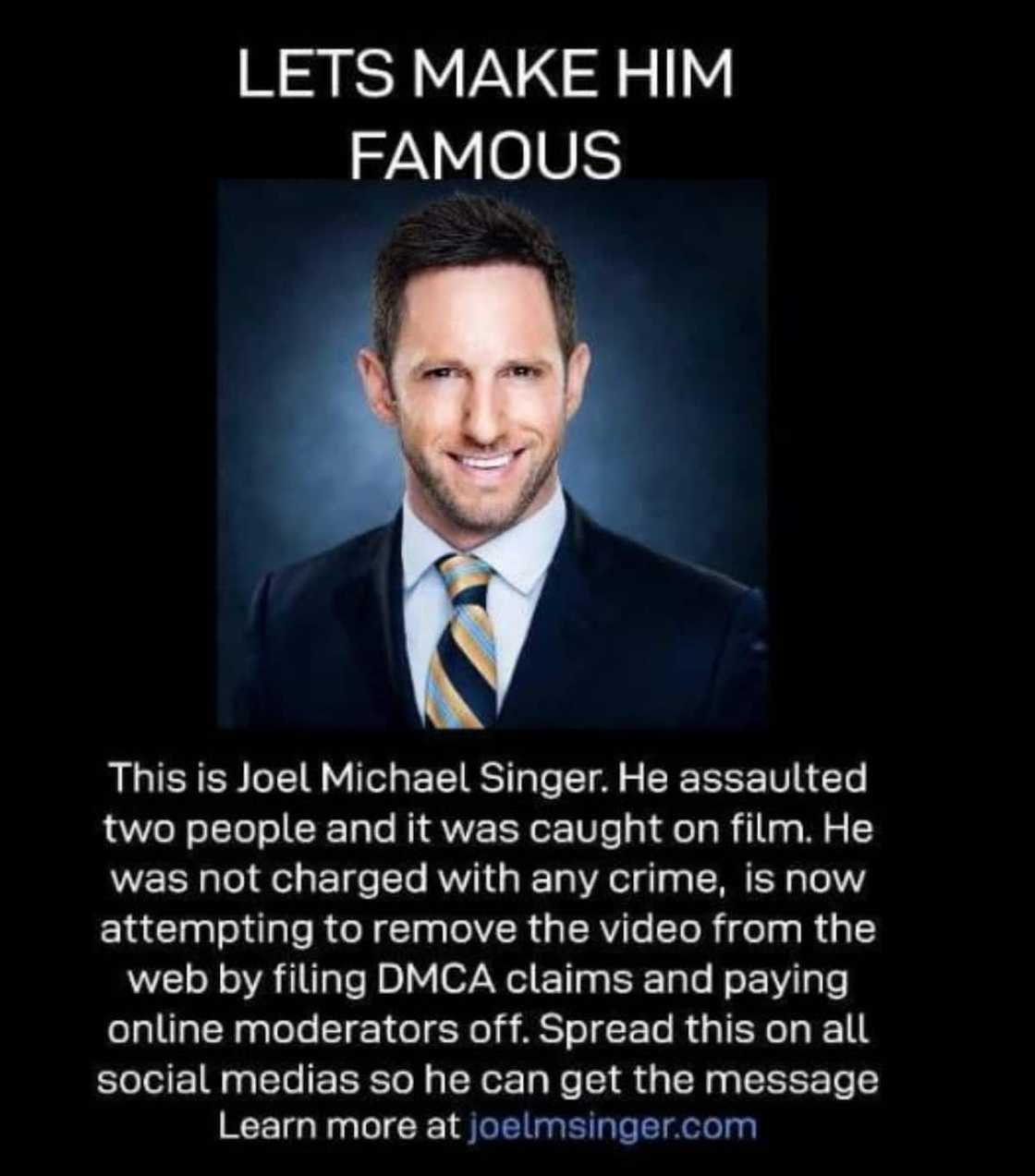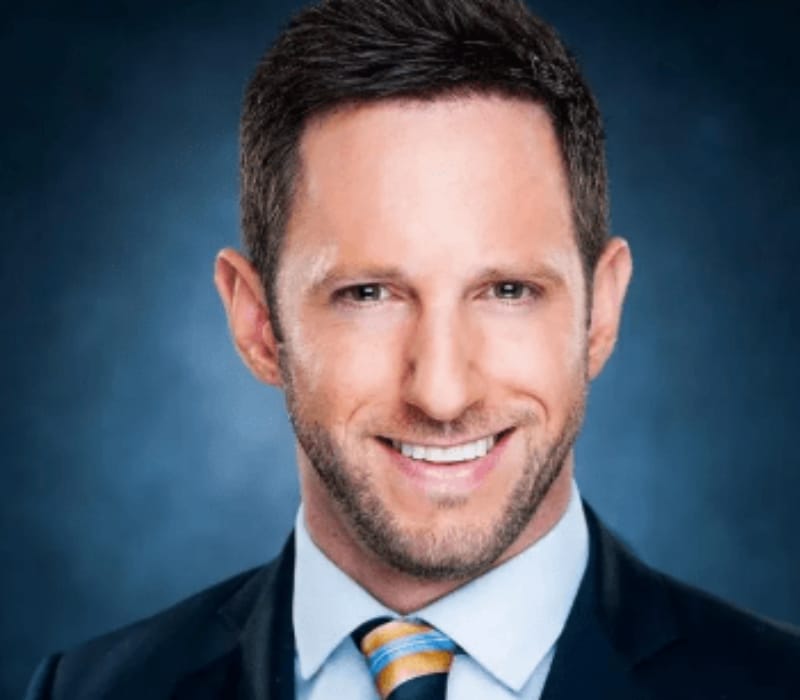Joel Michael Singer: Viral Fight, Bio, And Restaurant Incident Explained
Who is Joel Michael Singer, and why has a seemingly ordinary evening in a Florida restaurant catapulted him into the harsh glare of the public eye? The name "Joel Michael Singer" has become synonymous with a viral incident that raises questions about accountability, public perception, and the potential consequences of a momentary lapse in judgment.
In July 2019, the city of Fort Lauderdale, Florida, became the backdrop for an event that would quickly spread across the internet. At YOLO, a popular local restaurant, Joel Michael Singer was captured on video in an altercation that culminated in a headbutt. The ensuing video footage ignited a firestorm of online commentary, sparking debates about the rights and wrongs of the situation, and the responsibilities of those involved. Singer, an American man, found himself at the center of this unanticipated media frenzy, forced to grapple with the ramifications of his actions in the public sphere. The incident raised concerns about the public response and legal proceedings, yet few could have predicted the extent of its subsequent reach and impact.
| Full Name | Joel Michael Singer |
| Born | 1989 |
| Nationality | American |
| Ethnicity | Caucasian |
| Known For | Viral Restaurant Incident in Fort Lauderdale, Florida (2019) |
| Profession | Former Financial Planner (Alleged) |
| Notable Actions | Headbutting incident at YOLO restaurant, attempting to remove the video from online platforms, apologizing to Steven Heflin |
| Alleged Experience | 40 years in Neuroscience (disputed) |
| Alleged Role in USA Health Neurosurgical Association | Honorary President (2018) |
| Personal Wealth | From a wealthy family |
| Website Reference | Example Website - Placeholder (replace with authentic source) |
The circumstances surrounding the incident have been the subject of considerable speculation. Reports indicate that Singer, born in 1989, was involved in an altercation at YOLO restaurant. While the details remain somewhat opaque, it's clear that his actions, captured on camera, resulted in a significant public response. The video's rapid dissemination across the internet, particularly on social media platforms, transformed a private incident into a public spectacle. This raises questions regarding privacy and the potential for digital evidence to shape reputations and outcomes.
The immediate aftermath of the event saw Singer attempting to control the narrative. Reports suggest he sought to have the video removed from various online platforms, a strategy that reflects the concern over the potential damage to his reputation and the desire to contain the spread of the footage. This tactic, however, proved ineffective, as the video's viral nature ensured its continued distribution across numerous sites. This underscores the inherent difficulty of managing information in the digital age, especially when events are recorded and shared by the public.
The involvement of Steven Heflin, who intervened to stop the altercation, also garnered attention. Singer later issued an apology to Heflin. This move suggests an attempt to mitigate the negative consequences of the incident and possibly improve Singer's public image. The act of contrition, however, was met with mixed reactions; while some viewed it as a sincere effort to make amends, others considered it a calculated attempt to salvage his reputation.
One of the most intriguing aspects of the story lies in Singer's background and the various descriptions of his professional life. While some sources identify him as a former financial planner, others suggest he possesses extensive experience in the field of neuroscience, even mentioning his honorary presidency of the USA Health Neurosurgical Association in 2018. However, it is important to note that such claims should be verified through reliable and independent sources. The juxtaposition of these portrayals offers a window into how information can be manipulated and presented in the digital age, highlighting the importance of critical evaluation and factual accuracy.
The incident is a microcosm of larger societal trends. It sheds light on the power of video in the digital era to shape public perception and the legal and ethical challenges surrounding such recordings. The viral nature of the video underscores the rapid spread of information in contemporary society, where events can transcend physical locations and reach global audiences within minutes. The repercussions, from reputational damage to potential legal ramifications, underscore the far-reaching influence of online platforms and their capacity to transform private moments into public events.
The incident has also led to a discussion about the role of wealth and social status. Singer is reported to come from an affluent family, and these financial circumstances have played a part in the narrative surrounding the case. This is underscored by claims that he may have used financial means to remove the video from circulation. This raises questions about the influence of financial power in navigating the aftermath of a public controversy, and how such resources might affect the pursuit of justice and accountability.
The incident has raised questions about how individuals react to viral videos. It highlights the ethical and legal considerations regarding sharing such material, along with the complex web of online discourse that ensues. The incident has also caused reflection about the concept of justice, especially when powerful individuals are involved. The lack of formal charges against Singer further complicates the matter, as it underscores the nuances of law, social power, and public sentiment.
The events surrounding Joel Michael Singer also illustrate the challenges of reputation management in the digital age. The viral nature of the video and the ensuing public scrutiny have created a case study in how a single event can shape an individual's public image. Singer's actions in response to the video's circulation - the attempts to have it removed, the apologies, and the various depictions of his background - offer a study in crisis management. These actions have also been criticized by some as potentially insincere, further complicating the narrative.
The story of Joel Michael Singer, then, is far more than a simple account of a restaurant altercation. It serves as a prism through which we can view broader themes, including the digital age, the power of social media, the ethics of privacy, and the impact of wealth and social status. The incident remains a compelling story about the challenges of personal accountability in a society increasingly defined by online platforms and the relentless pursuit of information.
The location of the incident, YOLO restaurant in Fort Lauderdale, Florida, adds another layer to the story. The choice of venue has become a physical symbol of the event itself, serving as a gathering point for media coverage and public discussion. The choice of location is not merely a geographic marker but a crucial element of the incident's narrative. It has evolved into a central point for discussions, and the location will likely be forever associated with the events that occurred there.
The timeline of events is crucial to understanding the full scope of the story. The incident unfolded in July 2019, when a video capturing Singer's actions went viral. The video's proliferation across social media platforms, and the ensuing public attention, swiftly marked this event as a critical turning point in his life. The progression of events, from the initial altercation to Singer's attempts to control the damage, represents a significant element in the story's long-term impact.
The roles played by different individuals involved in the incident also provide insight into the dynamics at play. The actions of the restaurant employee, the intervention of Steven Heflin, and Singer's own responses all add to the complexity of the story. Each person's actions and their reactions to the events shape the narrative's flow, highlight different perspectives, and lead to a deeper understanding of the situation. In particular, the actions of Heflin, who intervened to stop the altercation, demonstrate the importance of the bystander in a public conflict.
The question of legal responsibility is also central to the story's narrative. Despite the video evidence of Singer's actions, there are reports of a lack of charges. This outcome has raised concerns regarding the legal system, the influence of wealth, and the ways in which justice is delivered. The absence of any legal outcome has fueled public discussion. The legal implications of the incident continue to shape the ongoing conversation about the role of law and accountability.
The discussion of the incident also includes a commentary about the concept of public perception. The video's wide circulation, along with the various claims regarding Singer's background, have significantly affected his public image. The way in which his actions have been interpreted by the public, and the resulting reactions on social media, demonstrate the power of online media to shape reputations and influence how people are perceived. The public response, and the impact on his reputation, forms a key part of the story.
The story has also sparked discussions about the consequences of actions and the meaning of apology. Singer's expressions of regret, and the various descriptions of his actions, bring forward questions about the sincerity of his apology and the degree to which his actions are forgiven. This opens discussions about the responsibilities of individuals and the importance of taking ownership of their actions. The concept of repentance and making amends, in a context saturated with video footage and public commentary, is a crucial theme.
In addition to the immediate consequences, the story of Joel Michael Singer offers valuable insights into modern-day communication. The rapid dissemination of information, enabled by online platforms and social media, shows how events can go viral and spread across the globe in minutes. This rapid-fire dissemination of information raises ethical issues, the importance of media literacy, and the importance of responsible online behaviour. The story of Joel Michael Singer, in this respect, serves as a case study of how a single incident can be amplified and altered through the power of digital media.
The story of Joel Michael Singer, though rooted in a singular event at a Florida restaurant, holds greater meaning than that. It embodies essential themes, from social media's influence to the impact of wealth and public perception. The ongoing conversations, and the different interpretations of the incident, showcase the complexity of human behavior and the importance of ethical and legal considerations in the digital world. It also serves as a reminder of the potential consequences of our actions in the public eye and the importance of personal responsibility in today's society.
The incident is more than a story about a headbutt; it is also an examination of human behavior, accountability, and the ethical concerns that pervade our digital age. The case of Joel Michael Singer, viewed through the lens of the media, legal proceedings, and public opinion, provides an important lesson about the challenges that individuals face in an age of rapidly shared information.



Detail Author:
- Name : Mckenzie Towne
- Email : teagan.mcdermott@gmail.com
- Birthdate : 1981-10-05
- Address : 7473 Koch Lights Keelingland, CT 80359-0271
- Phone : +1.858.436.9755
- Company : Fadel, Kautzer and Corkery
- Job : Library Technician
- Bio : Deserunt totam cumque consequatur sunt quasi fuga. Sed voluptate et ea porro molestiae. Atque eveniet qui qui aut.